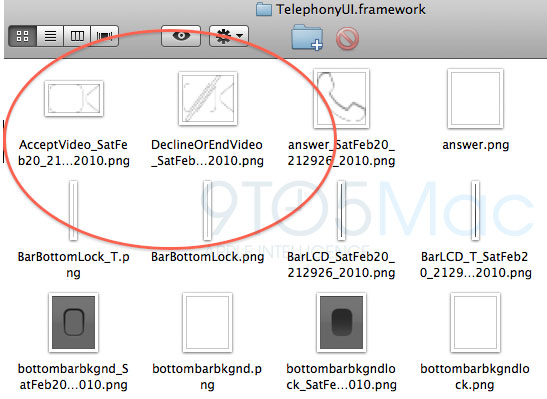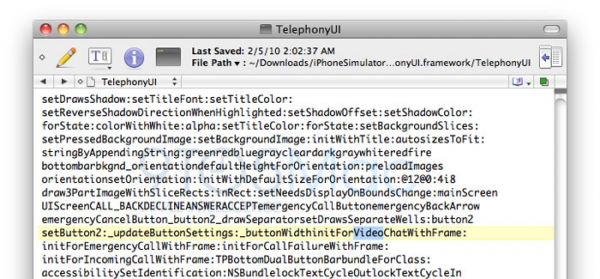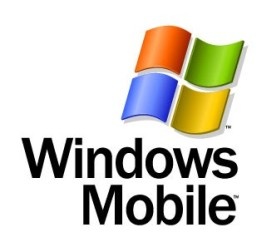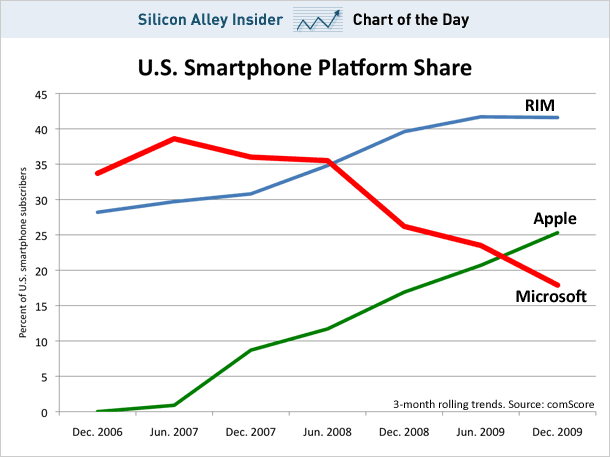Vevo creating Boxee app, says CEO |
- Vevo creating Boxee app, says CEO
- Future iPhone, iPads to include video chat support?
- Video Daily: HTC Sense with Flash 10.1 running on Nexus One
- Latest redsn0w beta brings back iPhone data tethering
- Interesting chart: The rise and fall of Windows Mobile
- Video Daily: The Motorola Devour in action
- Video Daily: FBI opens investigation into school webcam spying suit
- iPad to go on pre-sale starting next week, says report
- Nokis scraps 6216, third NFC handset
- Apple chucks adult apps out of App Store
- Sprint plans 4G mobile handsets in 2010
- Lawyer: Joel Tenenbaum only caused $21 in damages by sharing music
- Sony planning universal game console controller?
- Dear Google: Please end the Web's dependence on Flash, proprietary codecs
| Vevo creating Boxee app, says CEO Posted: 21 Feb 2010 10:46 AM PST  Vevo CEO Rio Caraeff has stated that the company is currently developing an app that will bring music videos to your HDTV via the upcoming Boxee Box set-top box. Vevo CEO Rio Caraeff has stated that the company is currently developing an app that will bring music videos to your HDTV via the upcoming Boxee Box set-top box. The company has distribution partners in YouTube and AOL, and is looking to continually expand. Boxee, which is currently in beta, has said they have almost 1 million users that have downloaded the software, and that number is expected to continue growing. Vevo is a joint venture between Universal Music Group and Sony Music Entertainment, using YouTube as a backend, and with financial support from AT&T and Abu Dhabi Media Co.. |
| Future iPhone, iPads to include video chat support? Posted: 21 Feb 2010 10:25 AM PST  9-to-5Mac has reported an interesting finding today, showing off what seems to be pretty concrete proof that future iPhone OS products such as later model iPads or iPhones will include video chatting support. 9-to-5Mac has reported an interesting finding today, showing off what seems to be pretty concrete proof that future iPhone OS products such as later model iPads or iPhones will include video chatting support. Found tucked away in the 3.2 SDK, are a few icons relating to video calling, such as "decline or end video" and "accept video." There are also some video chat related strings, as pictured. Of course it makes more sense that this may only be available for the iPad (which is expected to have a front facing camera) but future iPhones may get a second camera, it wouldn't be that far out of the realm of possibility.    |
| Video Daily: HTC Sense with Flash 10.1 running on Nexus One Posted: 21 Feb 2010 10:09 AM PST  AndroidCentral has posted a video of the Google Nexus One running a new custom ROM that was ported from the HTC Desire. The new ROM has HTC Sense, and has Flash 10.1 support. AndroidCentral has posted a video of the Google Nexus One running a new custom ROM that was ported from the HTC Desire. The new ROM has HTC Sense, and has Flash 10.1 support. |
| Latest redsn0w beta brings back iPhone data tethering Posted: 21 Feb 2010 09:46 AM PST  IntoMobile is reporting that the latest beta of the redsn0w jailbreaking utility, version 0.9.3 has brought back iPhone 3G data tethering to jailbroken devices, even for those with OS 3.1.2. IntoMobile is reporting that the latest beta of the redsn0w jailbreaking utility, version 0.9.3 has brought back iPhone 3G data tethering to jailbroken devices, even for those with OS 3.1.2. The new redsn0w uses an IPCC tethering hack, one that was overridden by Apple recently, but it appears the cat-and-mouse game is back on. The site posts a little how-to as well: Okay, maybe a little guidance is in order here. For clarification, you'll need the redsn0w 0.9.3 beta to get the IPCC tethering hack working again – find at the bottom of the page via the link above (or here). Once you've run redsn0w, you'll have to download a custom IPCC file (carrier bundle), which tells your iPhone that you are allowed to tether on a given carrier. 1. Point your iPhone Safari browser here, and download an IPCC file that corresponds to your region and carrier. 2. Once downloaded, install the IPCC file and replace your existing carrier bundle. 3. Navigate to Settings > General > Network on your iPhone to enable tethering. 4. You now have tethering enabled on your iPhone 3G/3GS running iPhone OS 3.1.2! |
| Interesting chart: The rise and fall of Windows Mobile Posted: 21 Feb 2010 09:30 AM PST  Silicon Alley Insider has posted their "Chart of the Day," and it is very interesting how such a simple chart can show how so much has changed, in not a very long period of time. Silicon Alley Insider has posted their "Chart of the Day," and it is very interesting how such a simple chart can show how so much has changed, in not a very long period of time. For the three year period ended December 2009, Windows Mobile fell from over 35 percent smartphone market share to about 17 percent, losing incredible amounts of share to Apple, RIM, and although not pictured, Android. Making the chart even more notable is the fact that Apple only has one device, the iPhone, whereas Windows Mobile can be the operating system for any number of mobile devices. The figures are via ComScore, which is known for its accuracy.  |
| Video Daily: The Motorola Devour in action Posted: 21 Feb 2010 09:12 AM PST |
| Video Daily: FBI opens investigation into school webcam spying suit Posted: 21 Feb 2010 08:41 AM PST  Earlier this week we reported that a lawsuit had been filed in US District Court accusing administrators at Lower Merion School District in Rosemont, PA of using webcams on a school-issued laptop to illegally spy on a student. Earlier this week we reported that a lawsuit had been filed in US District Court accusing administrators at Lower Merion School District in Rosemont, PA of using webcams on a school-issued laptop to illegally spy on a student. Today, the FBI has opened an investigation into the allegations, which is considered illegal wiretapping and a violation of student's privacy. District Superintendent Christopher McGinley denied the allegations: "At no time did any high school administrator have the ability or actually access the security-tracking software. We believe that the administrator at Harriton has been unfairly portrayed and unjustly attacked in connection with her attempts to be supportive of a student and his family. The district never did and never would use such tactics as a basis for disciplinary action." |
| iPad to go on pre-sale starting next week, says report Posted: 21 Feb 2010 08:29 AM PST  AppAdvice has posted a report today that the highly-hyped Apple iPad should go up for pre-order on the 25th, a little over a month before its release date on March 29th. AppAdvice has posted a report today that the highly-hyped Apple iPad should go up for pre-order on the 25th, a little over a month before its release date on March 29th. Citing a "reliable source," the site says the pre-order is for the U.S. only, and will be limited to the Wi-Fi model only. The 3G versions will not go up for pre-sale until later. Apple will not comment on rumors, but recently made the news when it was revealed that the company was keeping all freight details private, keeping launch proximity a secret. |
| Nokis scraps 6216, third NFC handset Posted: 21 Feb 2010 02:13 AM PST  Finnish mobile handset giant Nokia Corp. has scrapped its 6216 NFC handset. The 6216 was set to be the third Near Field Communication (NFC) equipped handset, but also the first that would see the operator's SIM control the payment system through the Single Wire Protocol (SWP). China Unicom had planned an NFC service launch and had chosen the SWP architecture. Finnish mobile handset giant Nokia Corp. has scrapped its 6216 NFC handset. The 6216 was set to be the third Near Field Communication (NFC) equipped handset, but also the first that would see the operator's SIM control the payment system through the Single Wire Protocol (SWP). China Unicom had planned an NFC service launch and had chosen the SWP architecture. "We felt the quality of the consumer experience was not what it needed to be," Nokia told NFC World when asked about the cancellation of the 6216. Nokia objects to giving total control to the operator instead of the handset itself. Using NFC technology, users can avail of a proximity payment system to carry out transactions, such as paying for public transport. Besides having the NFC to facilitate wireless communications, the handset would also need a lot of various elements to be stored safely that control the system securely. Operators have lobbied for the SWP standard which would store all of this important data in the SIM and facilitate such features, but Nokia would prefer that the secure module be embedded in the handset itself. This may be a setback for China Unicom, which has announced it will be launching an NFC-Forum-compatible service to compete with China Mobile's RF SIM system. |
| Apple chucks adult apps out of App Store Posted: 21 Feb 2010 01:23 AM PST  Apple Inc. has reportedly thrown out a bunch of applications for the iPhone that contain adult content under a new policy that bans all "overtly sexual content". Developers have been getting notices from Apple informing them that their applications have been removed from the App Store, without any prior warning or notification of a change in policy. Apple Inc. has reportedly thrown out a bunch of applications for the iPhone that contain adult content under a new policy that bans all "overtly sexual content". Developers have been getting notices from Apple informing them that their applications have been removed from the App Store, without any prior warning or notification of a change in policy. This could be a setback for some small app companies that were developing for the platform. On the Go Girls had half of its portfolio removed from the app store, while Jens Ltd was left with only one application remaining; and the purge is apparently on-going. A number of apps provided by Maxim were removed too, showing that established brands aren't being ignored either. Playboy's latest app is reportedly still up. "Whenever we receive customer complaints about objectionable content we review them. If we find these apps contain inappropriate material we remove them and request the developer make any necessary changes in order to be distributed by Apple," a statement from Apple reads. |
| Sprint plans 4G mobile handsets in 2010 Posted: 21 Feb 2010 01:23 AM PST  Sprint has announced that new 4G-compatible handsets will be available in the U.S. in the first half of 2010. The handsets will be dual-mode phones capable of using Sprint's 3G network in the U.S., while also using its 4G network when it becomes available. There is no information yet on who will be manufacturing the 4G-capable handsets for Sprint. Sprint has announced that new 4G-compatible handsets will be available in the U.S. in the first half of 2010. The handsets will be dual-mode phones capable of using Sprint's 3G network in the U.S., while also using its 4G network when it becomes available. There is no information yet on who will be manufacturing the 4G-capable handsets for Sprint. The operator, along with Clearwire, offers the only commercially available 4G network in the United States. It backed WiMAX for its technology, which is faster to marker than Long-Term Evolution (LTE). Sprint and Clearwire offer WiMAX in a number of large cities in the country, and continue to roll-out the network in more cities. AT&T and Verizon have opted to use LTE for their 4G networks. Currently, the only use for Sprint's network is USB modems for Internet connectivity. The operator has said in the past that handset devices would become available, but none have materialized so far. Now, Forbes reports that handsets capable of using the 4G network will become available for subscribers in the first half of 2010. With Spring losing market share and subscribers to Verizon and AT&T, it had bet big on new 4G handsets to help it gain on its rivals. |
| Lawyer: Joel Tenenbaum only caused $21 in damages by sharing music Posted: 21 Feb 2010 01:22 AM PST  Charles Nesson, William F. Weld Professor of Law at Harvard Law School, who defends Joel Tenenbaum in his dispute with record labels, said that Joel has only caused $21 worth of damages from his activities. Tenenbaum was told to pay $675,000 in damages to record companies for downloading and sharing 30 songs using the Kazaa software. Nesson has described the damages as "monstrous and shocking." Charles Nesson, William F. Weld Professor of Law at Harvard Law School, who defends Joel Tenenbaum in his dispute with record labels, said that Joel has only caused $21 worth of damages from his activities. Tenenbaum was told to pay $675,000 in damages to record companies for downloading and sharing 30 songs using the Kazaa software. Nesson has described the damages as "monstrous and shocking." "Had he purchased the 30 songs on iTunes, he would have paid 99 cents apiece, of which Apple would have passed on 70 cents to the record companies," Nesson argues. "Assuming, contrary to fact, that the record companies have zero costs so that every cent returned to them is profit, the total return would have been $21.00." Record companies say that statutory damages are a fair way to deal with P2P file sharing, since nobody really knows how many times a user downloaded any of the 30 tracks from Tenenbaum, or from most P2P users. Nesson believes that the actual loss of revenue caused by Tenenbaum's actions should instead be the amount of money he would have paid for the songs had be opted to purchase them legally. "Not a single person who downloaded these songs using Kazaa would have been impeded from obtaining them had Tenenbaum blocked access to his share folder. Tenenbaum was not a seeder of any of these songs... Once the initial seeds had proliferated, the addition of one more copy to the unlimited, easily-accessible supply could have had no economic consequence whatsoever. Plaintiffs would not have realized a single additional sale had Tenenbaum blocked access to his share folder," Nesson wrote in his final arguments on the issue of damages. According to Nesson, statutory damages ought to bare some relation to actual damages, and cites the reduction of damages by a Judge in the Jammie Thomas-Rasset case (which is set to go to its third trial). "In 2008, one study reported that the average British teenager had 800 illegal tracks on his iPod. If $22,500 per infringement were constitutional, this would mean the average teenager is exposed to an $18 million dollar verdict against him, clearly an absurd, arbitrary, and unconstitutional result," Nesson argues. "For additional absurdity, imagine further that the industry actually got judgments of $18 million in damages from roughly 30,000 teenagers, which is approximately the number of lawsuits they filed against consumers until the end of 2008. That would mean they had outstanding judgments for $540 billion dollars—or more than the total revenue the recording industry can expect to earn in about 50 years at its current size of $11 billion per year." |
| Sony planning universal game console controller? Posted: 21 Feb 2010 01:22 AM PST  According to a concept that surfaced in the US Patent & Trademark Office's online database, Sony may be looking to exploit the growing market for gaming accessories by developing a Universal Game Console Controller. The LCD touch-screen gamepad could emulate controllers for Nintendo systems, Microsoft systems and even some older legacy hardware. According to a concept that surfaced in the US Patent & Trademark Office's online database, Sony may be looking to exploit the growing market for gaming accessories by developing a Universal Game Console Controller. The LCD touch-screen gamepad could emulate controllers for Nintendo systems, Microsoft systems and even some older legacy hardware. The information on the concept says it could "emulate the controllers of popular game consoles, such as…the PlayStation, a controller made by Nintendo, Xbox game controllers made by Microsoft, Amiga CD-32 controllers, Atari Jaguar controllers, Gravis Gamepad controllers, Sega controllers, and Turbographics controllers." The button layout of the gamepads would be displayed on the LCD screen, which could store three types of control schemes at a time. A special receiver would be used to pass controller data, and the pad could come with rumble functions as well as integrated speakers. "It may now be appreciated that among other advantages, the controller provides for backward compatibility so that it may be programmed to emulate the key layout of an older controller that may no longer be available," the filing reads. While the U.S. retail market for games slumped 13 percent in January, according to NPD figures, accessories did see a 2 percent gain over January of 2009, the second consecutive month for year-over-year growth for the segment. |
| Dear Google: Please end the Web's dependence on Flash, proprietary codecs Posted: 20 Feb 2010 11:19 PM PST  A new letter has been posted to the Free Software Foundation (FSF) website, which is interesting and worth a read. A new letter has been posted to the Free Software Foundation (FSF) website, which is interesting and worth a read. The full post: Dear Google, With your purchase of On2, you now own both the world's largest video site (YouTube) and all the patents behind a new high performance video codec -- VP8. Just think what you can achieve by releasing the VP8 codec under an irrevocable royalty-free license and pushing it out to users on YouTube? You can end the web's dependence on patent-encumbered video formats and proprietary software (Flash). To sit on this technology or merely use it as a bargaining chip would be a disservice to the free world, while bringing at best limited short-term benefits to your company. To free VP8 without recommending it to YouTube users would be a wasted opportunity and damaging to free software browsers like Firefox. We all want you to do the right thing. Free VP8, and use it on YouTube! Why this would be amazing The world would have a new free format unencumbered by software patents. Viewers, video creators, free software developers, hardware makers -- everyone -- would have another way to distribute video without patents, fees, and restrictions. The free video format Ogg Theora was already at least as good for web video (see a comparison) as its nonfree competitor H.264, and we never did agree with your objections to using it. But since you made the decision to purchase VP8, presumably you're confident it can meet even those objections, and using it on YouTube is a no-brainer. You have the leverage to make such free formats a global standard. YouTube is the world's largest video site, home to nearly every digital video ever made. If YouTube merely offered a free format as an option, that alone would bring support from a slew of device makers and applications. This ability to offer a free format on YouTube, however, is only a tiny fraction of your real leverage. The real party starts when you begin to encourage users' browsers to support free formats. There are lots of ways to do this. Our favorite would be for YouTube to switch from Flash to free formats and HTML, offering users with obsolete browsers a plugin or a new browser (free software, of course). Apple has had the mettle to ditch Flash on the iPhone and the iPad -- albeit for suspect reasons and using abhorrent methods (DRM) -- and this has pushed web developers to make Flash-free alternatives of their pages. You could do the same with YouTube, for better reasons, and it would be a death-blow to Flash's dominance in web video. But even some smaller actions would also have an impact. You could interest users with HD videos in free formats, for example, or aggressively invite users to upgrade their browsers (instead of upgrading Flash). Steps like these on YouTube would quickly push browser support for free formats to 50% and beyond, and they would slowly increase the number of people who never bother installing Flash. If you care about free software and the free web (a movement and medium to which you owe your success) you must take bold action to replace Flash with free standards and free formats. Patented video codecs have already done untold harm to the web and its users, and this will continue until we stop it. Because patent-encumbered formats were costly to incorporate into browsers, a bloated, ill-suited piece of proprietary software (Flash) became the de facto standard for online video. Until we move to free formats, the threat of patent lawsuits and licensing fees hangs over every software developer, video creator, hardware maker, web site and corporation -- including you. You can use your purchase of On2 merely as a bargaining chip to achieve your own private solution to the problem, but that's both a cop-out and a strategic mistake. Without making VP8 a free format, it's just another video codec. And what use is another video format with patent-limited browser support? You owe it to the public and to the medium that made you successful to solve this problem, for all of us, forever. Organizations like Xiph, Mozilla, Wikimedia, the FSF, and even On2 itself have recognized the need for free formats and fought hard to make it happen. Now it's your turn. We'll know if you do otherwise that your interest is not user freedom on the web, but Google's dominance. We all want you to do the right thing. Free VP8, and use it on YouTube! |
| You are subscribed to email updates from AfterDawn.com To stop receiving these emails, you may unsubscribe now. | Email delivery powered by Google |
| Google Inc., 20 West Kinzie, Chicago IL USA 60610 | |


0 comments:
Post a Comment